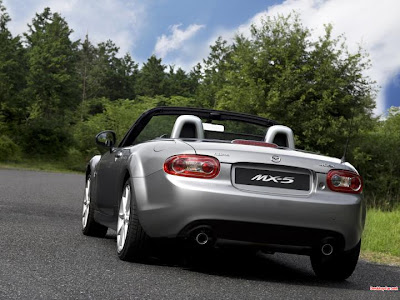Mazda MX5 Cars - First generation (NA)
In November 1993, in an attempt to boost sales, Mazda of Australia introduced an automatic transmission as an option on the MX5 for the first time. Unfortunately, sales continued to decline, and hit an all-time low of just 197 units in 1995.
For the 1994 model year, the first-generation MX5 was freshened with the introduction of the more powerful 1.8 L (110 cu in) BP-ZE engine, dual airbags and a limited slip differential in some markets. The chassis was substantially braced to meet new side-impact standards, most visibly by adding a "track bar" between the seatbelt towers inside the car, but also to the front and rear subframes. Also, 1994 and 1995 were the only years in which Mazda offered a light metallic blue paint (Laguna Blue Mica), making these cars rare collectors cars to some. 1994 also saw the introduction of the "R" package, a sport-themed package with Bilstein shocks and subtle underbody spoilers, in addition to the removal of unnecessary items such as power steering. No body style changes were made, though.
The new 1.8 L (110 cu in) engine produced 98 kW (131 bhp), which was then increased by 1 kW (1.3 bhp) for the 1996 model year. The base weight increased to 990 kg (2,200 lb). Performance was improved slightly, the additional power being partly offset by the extra weight. In some markets such as Europe, the 1.6 L (98 cu in) engine continued to be available as a lower-cost option, but was detuned to 66 kW (89 bhp). This lower-powered model did not receive all the additional chassis bracing of the new 1.8 L (110 cu in). Japanese and US cars were fitted with an optional Torsen LSD, which was far more durable than the previous viscous differential.
For the 1994 model year, the first-generation MX5 was freshened with the introduction of the more powerful 1.8 L (110 cu in) BP-ZE engine, dual airbags and a limited slip differential in some markets. The chassis was substantially braced to meet new side-impact standards, most visibly by adding a "track bar" between the seatbelt towers inside the car, but also to the front and rear subframes. Also, 1994 and 1995 were the only years in which Mazda offered a light metallic blue paint (Laguna Blue Mica), making these cars rare collectors cars to some. 1994 also saw the introduction of the "R" package, a sport-themed package with Bilstein shocks and subtle underbody spoilers, in addition to the removal of unnecessary items such as power steering. No body style changes were made, though.
The new 1.8 L (110 cu in) engine produced 98 kW (131 bhp), which was then increased by 1 kW (1.3 bhp) for the 1996 model year. The base weight increased to 990 kg (2,200 lb). Performance was improved slightly, the additional power being partly offset by the extra weight. In some markets such as Europe, the 1.6 L (98 cu in) engine continued to be available as a lower-cost option, but was detuned to 66 kW (89 bhp). This lower-powered model did not receive all the additional chassis bracing of the new 1.8 L (110 cu in). Japanese and US cars were fitted with an optional Torsen LSD, which was far more durable than the previous viscous differential.


